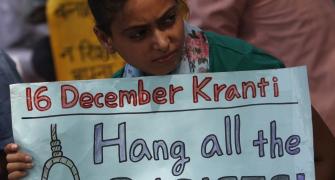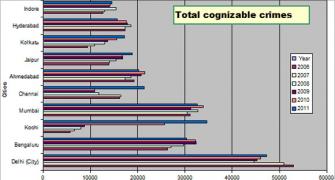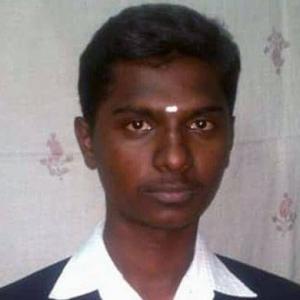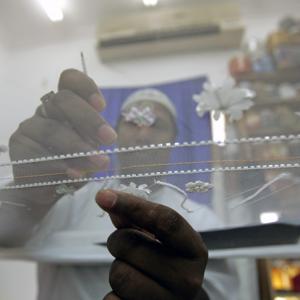 The incidence of more crimes across Tamil Nadu is threatening to make law and order an inevitable poll issue in the state-wide local bodies elections due only months from now, says N Sathiya Moorthy.
The incidence of more crimes across Tamil Nadu is threatening to make law and order an inevitable poll issue in the state-wide local bodies elections due only months from now, says N Sathiya Moorthy.
Even as the sensational ‘Swathi murder case’, about the daylight killing of a young, female IT professional on a railway platform, is hogging national headlines, the incidence of more crimes across Tamil Nadu is threatening to make law and order an inevitable poll issue in the upcoming state-wide local bodies elections, due only months from now.
There is some truth in what Greater Chennai police boss, Commissioner T K Rajendran, said about not all killings being ‘contract-killings’ involving gangster groups. He referred to one case in particular, where a woman had allegedly got her husband killed with the help of some men....Whether to dub it gangster killing or not is for the police chief to explain.
It’s not even about individual cases, and not even about the possibility that Tamil Nadu has suddenly become the ‘crime capital’ of India, as the political Opposition would want the voter to believe.
But there is no denying the over-play of crime reports in the media -- both print and electronic -- more so after the high-decibel campaigns for the May 19 elections to the state assembly.
Between the historic 1996 poll verdict that saw the ruling All India Anna Dravida Munnetra Kazhagam trounced and first-term Chief Minister Jayalalithaa losing her seat, and her December 6 arrest on corruption charges, the Tamil pulp press was losing the high poll-time figures to ‘normal’ figures in non-election times. Likewise, the nascent TV news channels and news programmes too were losing TRP during those post-poll months, filled with anti-climax of one kind or the other.
It was then that the ‘Navarasu murder case’ hit the newspapers during that ‘sensation’ interregnum. The pulp media in particular made mincemeat of the gruesome killing of a medical student whose body parts had been strewn around a railway track, through long distances. It became an even greater sensation when the police found out that the killer was a fellow medical student, who had systematically cut the corpse after the killing, that too in a college hostel room.
Today, when the hyped-up assembly poll campaigns and media coverage are all things of the past, the media could not have savoured the ‘Swati killing’ more. So too with the series of crimes that have suddenly caught the media’s eyes -- and more so of the social media -- that the common man, always on the run and always with a mobile phone on hand, cannot miss, or ignore.
Between the Navarasu murder and the Swathi killing, the national (English language) newspapers in particular have had to shed their traditional inhibitions bordering on self-assertion and disdain, to take off from 24x7 TV news coverage, be it in English or Tamil.
It’s thus alone could they hope to stay relevant to the next morning’s readers and stay afloat, too. ‘Analysis’ is the name of the game on politics and economics, sensationalism is the equivalent in matters of readers’ daily living and working -- or, so have they come to believe and have been proved to be.
In the normal course, people are believed to be voting on policy issues in parliamentary polls, law and order, price and availability issues in assembly elections, and civic amenities, including roads and street-lighting, drinking water and drainage overflow in local bodies’ elections, be it for city corporations or urban municipalities or rural panchayats and panchayat unions.
That trend seems to be heading for a change in voter priority in the TN local bodies polls due later this year. Getting over the weariness of a long and noisy assembly poll campaign has been enough for the state’s voters through the past two decades, when stalled local bodies polls were re-introduced after a long break in 1996.
Despite political claims to the contrary on the overall victor and loser in the local government polls, the voter apathy has been astounding, to the point of their not bothering about large-scale bogus voting in their own name, wherever reported.
This time, after the assembly polls, crimes of every kind has been in the newspapers and news channels, almost every day. Respectable newspapers are becoming ‘rag sheets’, owing to greater penetration in competitive news coverage, leading to quicker and greater expose of crime -- though not of punishment, all the time.
The ‘Swathi murder’ may be the one that caught the rest of the nation’s eyes, but across the state, there have been crimes of every other kind, getting reported by the hour, by the day.
‘Social media crimes’ seem to be topping the imagination, possibly not necessarily the charts. Facebook postings-induced rape, killing or elopement, misunderstood friendships and identities, caused by the anonymity that social media does not actually give, apart from outright cyber crimes of the kind, drawing from morphed pictures of young girls in personal moments are all becoming factors in the burst in the crime-chart.
But there are more ordinary, mundane crimes, like chain-snatching and purse-snatching that have gone awry -- leading to possibly unanticipated deaths. In the case of the most recent Chennai death of a school teacher, the question also arises why within a fortnight of the cold-blooded Swathi killing, she felt the urgent need to withdraw money from an ATM hours after sunset, that too using a side-road where the traffic would have been thin at that hour.
A purse-snatcher, whom she gave a hot chase to, kicked her bike while escaping in his, and she fell down to her death -- so did a late-evening walker who got caught in the melee for no fault of his. The dead woman’s pillion-rider, a niece, is in hospital, with broken bones in the pelvic region.
Less said about the coverage of crimes in other parts of the state, but they have not stopped coming. A girl committing suicide over a morphed picture and the policemen allegedly demanding -- and getting a new mobile phone -- for even registering a case against the suspect, all make it to the news channels instantly, and to the newspapers the next morning.
In all this, more than the crime by criminals, first-timers or otherwise, it’s the police apathy and indifference, greed and corruption, that impact on the performance of the government and its political leadership -- especially during election time.
It’s this that is getting increasing focus, this time round than at any time in the past, the long run-up to the recent assembly polls included. Better or worse still, each of these episodes not only has reached the last voter in the state but there is also the local version of a similar episode, reported or not.
It’s like the good old times, when every village and locality had a local episode of political corruption, to believe in the larger picture when painted by the political opposition -- and vote accordingly as all that the latter said was the truth, whole truth and nothing but the truth.
It had incidentally begun with the historic 1967 polls that the ruling Congress lost -- never to return to power so far. The DMK Opposition had plastered the state’s walls with pictures of a Chennai bungalow, where in a small portion AICC president Kamaraj had lived as a tenant -- but made it out as if the self-proclaimed friend of the poor owned it.
In polls in particular, perceptions do matter as much as performance. Already, for instance, ‘Swathi killer’ Ramkumar has filed a bail application that he has been framed -- or, at least a lawyer has filed a petition on his behalf.
In between, the Madras high court has ordered a CBI probe into two cases of political sensation -- one, the suicide of a woman police officer, Vishnupriya, alleging that her bosses had forced her to follow a particular line of investigation in a sensational murder case. The other is the ‘570-crore-rupee’ case, about the recovery of that much money in the midst of the assembly poll campaign, which State Bank of India later claimed was money in transit.
Investigations into this case, the CBI reporting to the high court from time to time, and their periodic reportage in the local media, all could add value to campaign pieces, one way or the other. So could the Supreme Court’s reserved judgement in the ‘disproportionate assets’ case against CM Jayalalithaa, which is more than a law and order issue.
Yet, when the Bangalore trial court ordered her imprisonment in the case, it also became a land and order issue nearer home in Tamil Nadu, triggering strong media and public reactions -- and not necessarily in that order.
Image: The murdered techie S Swathi.
N Sathiya Moorthy, veteran journalist and political analyst, is director, Observer Research Foundation, Chennai Chapter.










